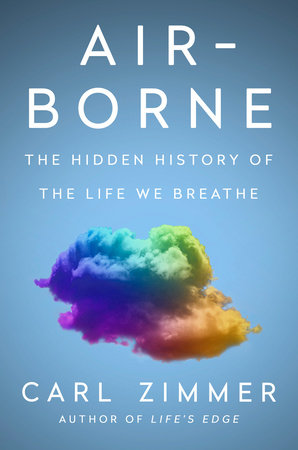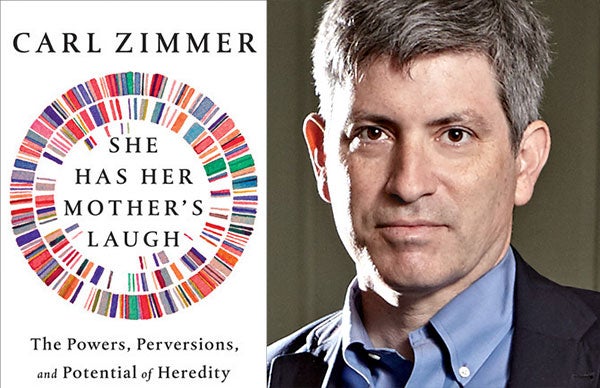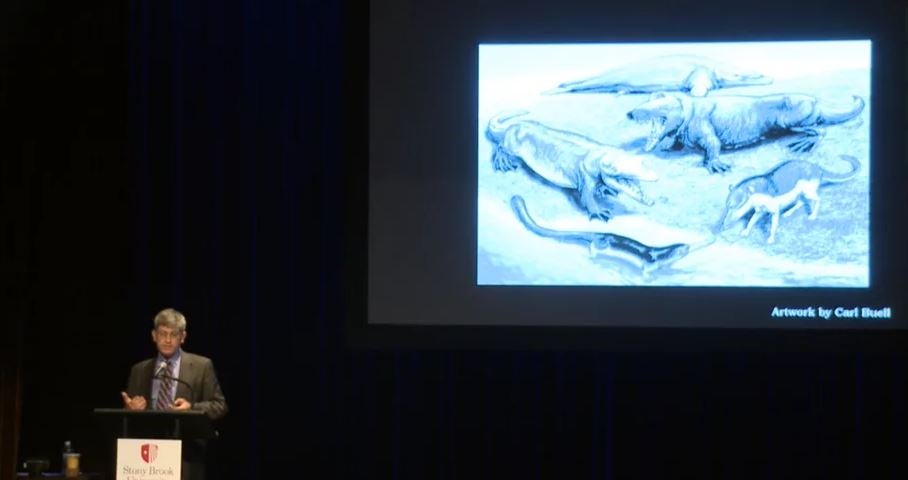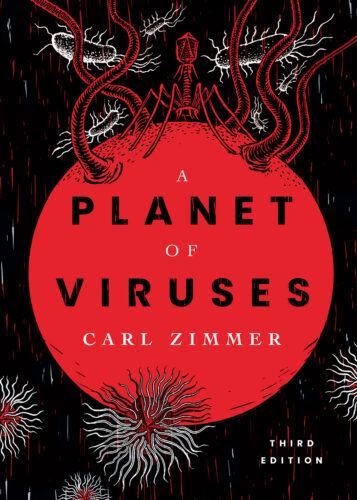Carl Zimmer
New York Times columnist and award-winning science journalist
Photo Courtesy of the Author
-
About Carl Zimmer
Carl Zimmer is, in the words of New York Magazine, “the country’s most respected science journalist.” He has twice won the National Academies Communication Award and is a three-time winner of the American Association for the Advancement of Science Journalism Award. He has earned an Online Journalism Award twice for his reporting. In addition, Zimmer was awarded the Stephen Jay Gould Prize, and the National Association of Biology Teachers gave him their Distinguished Service Award. Zimmer has written for The New York Times since 2004, where he writes the “Origins” column. During the Covid-19 pandemic, he contributed to the coverage that won The New York Times a Pulitzer Prize in 2021. Zimmer has also contributed hundreds of articles to magazines such as National Geographic and The Atlantic, and he is the author of fifteen widely praised books about science.
Zimmer has spoken at Aspen Ideas Festival and other major venues. He has given lectures at many of the country’s leading universities, medical schools, and museums, and regularly gives keynote lectures at scientific conferences. Zimmer has enthralled audiences with insightful, engrossing talks on topics ranging from the cutting edge of medicine, to the history of the scientific revolution, to the wonderful creepiness of parasites. He is also a frequent guest on programs such as The Daily, Fresh Air, and Radiolab.
His latest book, Life’s Edge: The Search for What It Means Be Alive, has earned wide acclaim. In a cover review for the New York Times Book Review, Siddhartha Mukherjee praised Zimmer’s “elegant, deeply researched book,” writing that “this book is not just about life, but about discovery itself. It is about error and hubris, but also about wonder and the reach of science.” Zimmer’s 2018 book She Has Her Mother’s Laugh: The Power, Perversions, and Potential of Heredity, won the Communications Award from the National Academies of Science, Engineering, and Medicine, as well as the Science in Society Journalism Award from the National Association of Science Writers. The Guardian named it the best science book of 2018, and the New York Times Book Review named it a notable book of the year. Both Life’s Edge and She Has Her Mother’s Laugh were finalists for the PEN/E.O. Wilson Literary Science Writing Prize.
Zimmer’s other works include A Planet of Viruses, which entered its third edition in 2021 with a new chapter on Covid-19; Evolution: The Triumph of an Idea, Soul Made Flesh, named one of the top 100 books of the year by The New York Times Book Review; At the Water’s Edge; and Parasite Rex. His 2008 book, Microcosm: E. coli and the New Science of Life was a finalist for the Los Angeles Times Book Prize and he is also the author of a groundbreaking textbook about evolution, The Tangled Bank. Zimmer’s books have been supported by fellowships from the John Simon Guggenheim Memorial Foundation and the Alfred P. Sloan Foundation.
From 1994 to 1998 Carl Zimmer was a senior editor at Discover before turning to writing full-time. His work has appeared in The Best American Science series as well as The Best American Science and Nature Writing series. In 2023, Zimmer was the guest editor of The Best of American Science and Nature Writing. He is a professor adjunct in the Department of Biophysics and Biochemistry at Yale University, where he teaches writing and biology.
Contact us for more information about booking Carl Zimmer for your next event.
-
Speaking Topics
Air-Borne: The Hidden History of the Life We Breathe
In this engaging talk based on his new book, AIR-BORNE, Carl Zimmer takes audiences on an odyssey through the most mysterious ecosystem on the planet, which extends from our lungs to the top of the stratosphere. His talk leaves audiences looking at the aerobiome with new eyes—as a realm into which oceans and forests loft trillions of cells into the sky, where microbes eat clouds, and where the next pandemic may be lurking.
Is Artificial Intelligence Going To Figure Out Life Itself?
Artificial intelligence is increasingly becoming a part of our everyday lives, from planning vacations to editing photos. But biologists are using the same underlying software to explore some of the deepest mysteries of life. These foundation models, as they're called, can learn by themselves how proteins fold into their intricately complex structures. They can make up new proteins from scratch. Even more ambitiously, foundation models are making sense of how thousands of genes work together inside our cells to keep us alive. In a few weeks, computers can analyze data from millions of cells and teach themselves some of the most fundamental principles of biology. What will they discover next? And will they put biologists out of a job? In this talk, Carl Zimmer draws on his reporting for the New York Times and in books like Life Itself to take his audience on a mind-bending trip into the not-so-distant future, when computers can discover how to make new kinds of cells, and maybe new kinds of life.
How Can We Survive on a Planet of Viruses?
In his 2011 book A Planet of Viruses, Carl Zimmer warned that a virus that lived in a bat or some other animals would adapt to humans and sweep across the world. "We don't know which virus will create the next great epidemic," he wrote. "But that doesn't mean that we can simply ignore them. Just the opposite: there are the viruses we need to block before they get a chance to make the great leap into our species." A decade later, the Covid-19 pandemic matched that prediction. At the New York Times, Zimmer published a string of front-page stories on the race to understand the new coronavirus, to create drugs to stop infections, and to develop vaccines in record time. In this lecture he talks about what we need to learn from this experience how to become better prepared for the next virus waiting to create the next great epidemic.
Reporting Science in an Age of Disinformation
The Covid-19 pandemic fueled a surge of disinformation about science on social media, podcasts, and newsletters. This talk will survey the precarious state of public understanding of science, and why it is crucial to meeting humanity’s greatest challenges, from emerging diseases to global warming.
Life’s Edge: The Search For What It Means To Be Alive
In this lecture, Carl Zimmer explores the most fundamental question in biology: what is life? The answer remains surprisingly elusive. In Zimmer’s widely acclaimed book Life’s Edge, he explores the nature of life and investigates why scientists have struggled to draw its boundaries. He handles pythons, goes spelunking to visit hibernating bats, and even tries his hand at evolution. Zimmer visits scientists making miniature human brains to ask when life begins, and follows a voyage that delivered microscopic animals to the moon, where they now exist in a state between life and death. From the coronavirus to consciousness, Zimmer demonstrates that biology, for all its advances, has yet to achieve its greatest triumph: a full theory of life.
She Has Her Mother’s Laugh: The Powers, Perversions, and Potential of Heredity
In this lecture, Carl Zimmer redefines heredity, weaving together historical and current scientific research, exemplary original reporting, and his own experience as a parent of two daughters. Introducing audiences to the not-too-distant future, Zimmer explores the ways in which DNA editing with the powerful new tool CRISPR may change our world—and ourselves. He fearlessly examines controversial topics (Do races actually exist? Is success inherited?) in light of current advances in DNA analysis, and discusses the ways in which heredity has historically been used to justify racism and social inequality. By challenging long-standing presumptions about heredity, Zimmer takes audiences on a journey of discovery about who we really are, where we came from, and what we can pass on to future generations.
A Journey to the Center of the Brain
Our brains are the foundation for who we are—they store our memories, give rise to our emotions, and enable us to look to the future. But our brains remain terra incognita, an inner continent that remains barely explored. Only now are scientists beginning to map the brain in its full complexity, mapping some of its 80 billion neurons and their trillions of connections with each other. The results, while early, are mind-blowing to contemplate. Already, brain-mapping has improved people’s lives, enabling scientists to implant electrodes in the brain to help people with Parkinson’s regain their ability to walk, and also to give paralyzed people the power to control computers. In the future, mapping the brain may point to better ways to treat disorders such as autism, depression, and Alzheimer’s disease. And, ultimately, we will gain an inner map of human nature itself.
Finding Lost Ancestors and Your Inner Neanderthal
Companies like 23andMe and Ancestry.com are introducing millions of people to the history inscribed in their DNA. Over hundreds of generations, our ancestors accumulated mutations that can reveal astonishing secrets, from unknown cousins to ancestral homeland to interbreeding with Neanderthals and other extinct kinds of humans. The science of molecular ancestry is now showing scientists how our ancestors evolved the features that made us uniquely human. But as we encounter these astonishing insights, we must also be aware of the limits of this research, and not try to use it to justify long-refuted myths about ethnicity and ancestry.
-
Video
-
Praise for Carl Zimmer
Excellent. Thoughtful. Effectively invited us to think about what life is and how hard it is to define. His Q&A was really interesting!
— Florida Atlantic UniversityThe event was a huge success! Carl was engaging, and we received EXCELLENT feedback,
— University of Rochester, River Campus LibrariesCarl’s talk was current, relevant, spiced with humor and everyone attending left with a better understanding about the history of brain research and the possibilities for the future. Definitely one of the best presentations the Forum Committee has experienced in many years.
— Appalachian State UniversityEverything went great with Carl’s visit. The lecture was just right for a broad audience that included both scientists and non-scientists. One specific comment that I heard from an attendee was that they appreciated the opportunity to view Darwinism in an unconventional way (incorporating evolution with the current topic of viruses), and that this deepened their knowledge of a subject that they were once closed to. We had a great turn out – about 250 people showed up (the room was just about at full capacity). Overall, it was a huge success!
— University of Alabama at BirminghamCarl delivered an excellent lecture. In my opinion, it was one of the best lectures we have hosted in the five years I have been at Auburn University. Those that I spoke to thoroughly enjoyed the lecture. His lecture was entertaining and thought provoking. It also had elements that would appeal to different facets of the diverse audience in attendance. He spoke about the science journalism process, integrity in journalism, the scientific process and integrity in science. As such, it touched on many diverse interests, while also providing depth and stimulating thought. Those that interacted with Carl personally found him to be engaging, charming, and pleasant.
— Auburn UniversityCarl Zimmer spoke about ‘Human Origins in a Controversial Age’ at Westport Library as part of the Library’s ongoing Community Conversations Series. He was well-prepared, and his accessibility and knowledge kept a demanding audience engaged in a most controversial topic.
— Westport Library, Westport, ConnecticutCarl Zimmer was a distinguished speaker in the Cornell University Lecturer series in the Fall of 2006. He was a tremendous hit here. His lecture was attended by more than 500 members of the Cornell University community. His skills in writing have made biology accessible and exciting to scientists and non-scientists alike.
— Cornell UniversityCarl Zimmer was invited to Princeton last winter where his talk ‘Evolution in the News’ was well-attended and warmly received. His lecture artfully wove classic and new examples of evolution from the perspective of a scientific writer into a very coherent and beautifully illustrated one-hour presentation that captivated the attention of both our undergraduate students in addition to some of the best evolutionary biologists of our time. Zimmer is well regarded as one of the best public agents for the science of evolution and it was amazing to see him in action – not only does he write beautifully and meaningfully about our field, but he brings it to life in front of an audience. I highly recommend this lecture to a variety of audiences where both the scholar and novice will, without a doubt, leave even more intrigued and excited about evolutionary biology.
— Princeton UniversityCarl Zimmer’s talk on Soul Made Flesh to a standing-room only audience at Stanford was the buzz of our community for weeks. He took us from the past to present, with a deep passion, intrigue and fascination for innovation in neuroscience that captured us all.
— Stanford University Medical SchoolCarl’s a superb speaker who combines a detailed knowledge of his subject matter with the wide-eyed fascination of a scientific outsider. He is a genuine intellectual who employs a plain-spoken and unassuming manner to address some of the most complex and most fascinating questions in science and scientific history. His talk was enthusiastically received by my colleagues and students, and I would recommend him to any organization or institution.
— Brown UniversityCarl Zimmer delivers lucid vignettes on the power of evolutionary thought in explaining organism design and biological history and diversity. During my introduction, I noted that one of the greatest disappointments for readers of Zimmer is coming to the end of one of his essays or books. The same applies to his talks. He presents complex material with clever visuals and thoughtful honest commentary, making the research he popularizes accessible and exciting to a broad audience. One also feels for the researchers Zimmer profiles; he is a master at elucidating the motivations and hardships (and unexpected blessings) in doing science.
— Carleton University, OttawaPraise for Air-Borne
Carl Zimmer has a knack for seeing the small things but thinking big. Air-Borne is full of fascinations at both levels. From the first page, you know you’re in the hands of a master.
— David Quammen, author of BreathlessA fish doesn’t know it’s wet. And we rarely recognize that we are bathed in air, air carrying multitudes of microbes. Air-Borne chronicles the history of this insight. With Zimmer’s usual superb writing, it is filled with fascinating science, visionary scientists who were often completely wrong, and poignant moments reflecting the vast human suffering caused by such microbes. And throughout is dread that makes Air-Borne a page-turner – the knowledge that the air eventually carried SARS-CoV-2 and may yet bring something worse. Air-Borne is deeply important and unsettling.
— Robert Sapolsky, author of Determined: A Science of Life Without Free WillPraise for Life’s Edge
Carl Zimmer shows what a great suspense novel science can be. Life’s Edge is a timely exploration in an age when modern Dr. Frankensteins are hard at work, but Carl’s artful, vivid, irresistible writing transcends the moment in these twisting chapters of intellectual revelation. Prepare to be enthralled.
— Jennifer Doudna, Nobel Laureate, co-author of A Crack in CreationFrom the struggle to define when life begins and ends to the hunt for how life got started, [Life’s Edge] offers an engaging, in-depth look at some of biology’s toughest questions.
— Science NewsA master science writer explores the definition of life… An ingenious case that the answers to life’s secrets are on the horizon.
— Kirkus ReviewsDiligently tackles the true definition of life… Zimmer invites us to observe, ponder, and celebrate life’s exquisite diversity, nuances, and ultimate unity.
— Booklist (starred review)A fascinating and well-written mapping of the edges of biology, which will have broad appeal to nonscientists.
— Library Journal (starred review)The pleasures of Life’s Edge derive from its willingness to sit with the ambiguities it introduces, instead of pretending to conclusively transform the senseless into the sensible.
— The Washington PostStories that both dazzle and edify… particularly brilliant in telling the story of DNA… Zimmer is an astute, engaging writer—inserting the atmospheric anecdote where applicable, drawing out a scientific story and bringing laboratory experiments to life. This book is not just about life, but about discovery itself. It is about error and hubris, but also about wonder and the reach of science.
— Siddhartha Mukherjee, New York Times Book Review“Profound, lyrical, and fascinating, Life’s Edge will give you a newfound appreciation for life itself. It is the work of a master science writer at the height of his skills—a welcome gift at a time when life seems more precious than ever.
— Ed Yong, author of I Contain MultitudesPraise for She Has Her Mother’s Laugh
In his superb book on heredity, She Has Her Mother’s Laugh, Carl Zimmer discusses how the proper understanding of heritable influences on intelligence and the related trait of educational attainment could be used to guide the design and evaluation of improved educational strategies. Intelligence, like height, is highly heritable, polygenically inherited and depends environmentally upon nutrition and opportunity. For this new knowledge to be used effectively, he argues, the very real genetic influences should be considered constitutional potential, rather than the more frequently grasped concept of genetic essence.
— Nature GeneticsNature’s laws are violated all the time, and the cardinal violator is nature itself. This is the paradox that Carl Zimmer explores in She Has Her Mother’s Laugh: The Powers, Perversions, and Potential of Heredity. Mr. Zimmer, a New York Times science columnist and author, is careful and well-informed. So when he says that research is overturning things you were taught in biology classes, he’s worth heeding. Acquired traits can be inherited. Biological time can turn backward. And monsters are real.
— Wall Street JournalIn this beautifully written, heartfelt and enjoyable masterpiece, Zimmer weaves together history, autobiography and science to elucidate the mysteries of heredity and why we should care. I couldn't put this book down, and can’t recommend it too highly."
— Daniel E. Lieberman, Harvard University, author of The Story of the Human BodyNobody writes about science better than Carl Zimmer. As entertaining as he is informative, he has a way of turning the discoveries of science into deeply moving human stories. This book is a timely account of the uses and misuses of some of the science that directly impact our lives today. It is also a career moment by one of our most important and graceful writers. Here is a book to be savored.
— Neil Shubin, University of Chicago, author of Your Inner FishWith this book, Carl Zimmer rises from being our best biological science writer to being one of our very best non-fiction writers in any field, period.
— Kevin Padian, professor of Integrative Biology and curator of Museum of Paleontology at UC BerkeleyZimmer is a born story-teller. Or is he an inherited story-teller? The inspiring and heartbreaking stories in She Has Her Mother’s Laugh build a fundamentally new perspective on what previous generations have delivered to us, and what we can pass along. An outstanding book and great accomplishment
— Daniel Levitin, McGill University, author of The Organized Mind and This is Your Brain on MusicOne of the most gifted science journalists of his generation, Carl Zimmer tells a gripping human story about heredity from misguided notions that have caused terrible harm to recent ongoing research that promises to unleash more powerful technologies than the world has ever known. The breadth of his perspective is extraordinarily compelling, compassionate, and valuable. Please read this book now.
— Jennifer Doudna, professor of Biochemistry and Molecular Biology at UC Berkeley, co-author of A Crack in CreationShe Has Her Mother’s Laugh is at once far-ranging, imaginative, and totally relevant. Carl Zimmer makes the complex science of heredity read like a novel, and explains why the subject has been–and always will be–so vexed.
— Elizabeth Kolbert, New Yorker staff writer and author of Pulitzer Prize winner The Sixth ExtinctionCarl Zimmer lifts off the lid, dumps out the contents, and sorts through the pieces of one of history's most problematic ideas: heredity. Deftly touching on psychology, genetics, race, and politics, She Has Her Mother's Laugh is a superb guide to a subject that is only becoming more important.
— Charles C. Mann, author of 1491No one unravels the mysteries of science as brilliantly and compellingly as Carl Zimmer, and he has proven it again with She Has Her Mother’s Laugh—a sweeping, magisterial book that illuminates the very nature of who we are.
— David Grann, author of Killers of the Flower Moon -
Books by Carl Zimmer
-
Media About Carl Zimmer
Request Fees
and Availability
- 212 572-2013
- Carl Zimmer travels from Guilford, CT
Featured Title

Air-Borne
“Another brilliant work from one of the very best science writers, Air-Borne will leave you agog at the incredible world that floats unseen around us, and outraged at the forces that stopped us from appreciating that world until, for many people, it was too late. It is a book about how much there is still left to know, and how frustrating it can be to turn knowledge into wisdom.”—Ed Yong, author of An Immense World






















